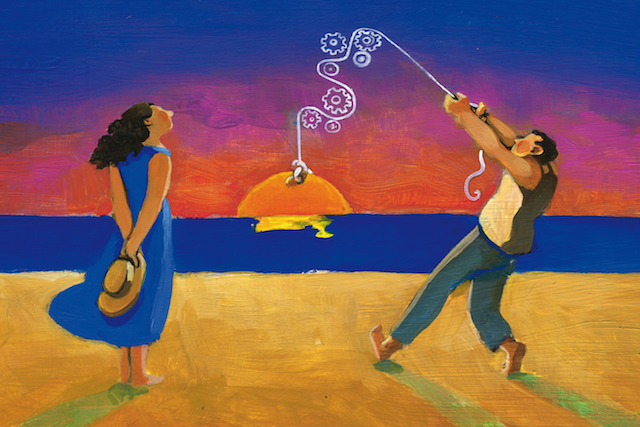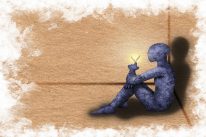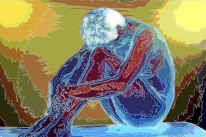
Most of us grow up believing that one day a handsome prince or beautiful princess will come our way and lead us into a life of “happily ever after.” No one knows what’s going to happen, but we’re certain it will be magical. We spend our childhoods desperate to grow up so that our lives can finally start when we meet “the one.”
The one who will make us happy. The one who will take all our cares away. The one who will love us, and only us, forever and ever.
Finally, we will be wanted and desired. We will be happy and feel great. Now our lives truly begin.
Only it doesn’t quite work out like that. I found out the hard way.
The Reality of Relationships
Relationships work well when two people take responsibility for taking care of themselves and their partner. Together they create a great life. They discuss what each of them wants to do and make plans on how they can make it happen. They support each other in achieving their couple goals as well as their individual goals.
No one expects the other person to make anything happen for them while they do nothing.
A healthy relationship requires two individuals who both give their best efforts to being the best and most loving version of themselves. This requires action with a sense of purpose and agency.
The Notion of Romanticized Love
The notion of love we grew up with is unhealthy. It portrays one partner—usually the female—as the victim that needs rescuing, while the other partner—usually the male—is the hero that saves the victim from tragedy or from herself.
This model serves no one. It is an outdated fairy tale that instills unhealthy beliefs in us that don’t match the realities of human relationships.
I grew up believing that I was lacking and had to wait for someone to give me worth and purpose. I believed that I had to earn someone’s love and that then, they would take care of me and provide me with a good life.
At no point did I ask myself what kind of life I wanted. In my mind, this was up to whoever was going to choose me. I took a completely passive position in life. I didn’t need to have visions or make plans because why would I, if my life was going to be provided by someone else?
Now, it might sound ridiculous to put it all like that, but it’s true, and not just for me. I see it over and over again in my private practice as a psychotherapist.
We may say that we are fully functioning individuals who don’t want to be rescued, but this is not what is happening within the adult relationships we are actually experiencing.
The Problem with Romanticized Love
Countless men and women come to me feeling disappointed, sad, and angry. They played out the roles they were given perfectly, and it did not lead to “happily ever after.”
Instead, there is relationship conflict, high drama, and painful disconnection. Eventually, there is nothing left but disappointment, bitterness, resentment, and hopelessness.
“What is wrong with me?” or “What is wrong with my partner?” they ask, but I can’t answer those questions because it’s not the people that are at fault; it’s the roles they unconsciously play.
Many of us do well when we’re single, but once we enter a relationship, we naturally drop into the roles of our unconscious relationship blueprint: the way we believe relationships work. And for most people this consists of either the role of the helpless victim or that of the enduring hero.
Sadly, both roles are highly disempowering, disrespectful and, in essence, unloving. This means that a healthy relationship is impossible.
The Unloving Roles of Romanticized Love
When I saw myself as someone who had to wait for someone else to make my life worthwhile, I didn’t realize that I was disempowering myself. I didn’t realize that I believed something that was untrue. I never questioned it. I just acted it out, by waiting.
I was miserable and far from able to create a happy and healthy life for myself. What can you learn from sitting around and waiting? I didn’t engage in life. I didn’t seek out opportunities and experiences that would have taught me new skills.
I stopped myself from learning, developing, and growing by sitting around and waiting, because what if I was busy doing something else while “the one” came looking for me? Then I would have messed it all up! It just didn’t seem worth the risk.
But also, I didn’t really have any ideas of my own. I followed my career plans, but apart from that there was not much going on in my life.
Believing myself to be a person who would find her worth and happiness in someone else utterly disempowered me. I did not see it then, but I can see it now as clear as day.
I also never realized just how much my expectations burdened my partners and how these expectations ultimately ended the relationships I had with them.
The Fallen Hero
I believe that my past partners wanted to be my hero. I believe they tried.
I know I wanted to be good for them and earn their love. I know I tried.
But life just doesn’t work that way. Relationships don’t. Love certainly doesn’t.
But we don’t know what we don’t know. And I didn’t know that 1. I wasn’t incomplete or broken, and not in need of fixing and 2. no person can gain their worth or happiness by saving or fixing another person. I’m pretty sure you didn’t know it then either.
We got the rules of love all wrong, and the roles we play made it impossible for us to connect and relate to our partners in healthy ways.
You would not believe how many fallen heroes I see in my practice. The majority of them are men, but the victim and hero roles are not gender-specific. They depend on the dynamic each couple creates, and some couples take turns in being the victim and each other’s hero.
When I sit with a fallen hero, I sense utter deflation. They have tried everything they can possibly think of. They have taken responsibility for things that weren’t their responsibility to start with. Very often, they neglected themselves in an attempt to make their partner happy, to stop them from complaining, to please them in whichever way they possibly could think of.
They are exhausted. They feel utterly drained by all of their attempts to be the hero not only their partner wishes they were but also who they wish they were. They’re disappointed in themselves and they feel like a failure, while also secretly—and sometimes not so secretly—seething with resentment toward their “difficult-to-please” partner.
I relate well to these clients because I have also taken on this role in some of my relationships. I have tried to be the best person I could possibly be for someone else.
The person who tries to fix all of their problems. The person who will go above and beyond to help them get what they want. The person who won’t say no and who is friendly to everyone. The person who is available at any time and will do anything—whether they feel like it or not, whether it’s a reasonable request or not, whether it’s good for them or not.
Because the thing with heroes is that their sense of worth comes from making others happy.
And so often it actually seems to work, which is why we keep trying. But it’s a self-perpetuating problem that eventually eats you alive. It consumes you so much you completely neglect yourself. You become a slave to the hero conditioning. You become cocooned within your role while all your dreams and wishes and desires silently suffocate.
And that is just sad and unloving.
No man or woman should have that pressure put on them. No one should ever accept that burden. There is no room for these kinds of unrealistic expectations in healthy relationships.
Our romantic partners are not our saviors.
They are not meant to fix us.
And after all, we don’t need fixing because we are not broken!
But we will play these roles because that’s what we think love means. We play them until we know not to, until we understand that they can never work and that they will only ever lead to two things: losing ourselves and losing our relationships.
Letting Go of Relationship-Hostile Beliefs
It’s not our fault that we play these roles. These roles are incorporated in our relationship blueprint, which consists of mostly unconscious beliefs about relationship roles and rules. Roles and rules we observed as children. Roles and rules that have also been culturally reinforced for decades.
But awareness and understanding spell an end to these unconscious beliefs and patterns. It doesn’t matter which roles we assumed or which dynamics we co-created. We do not victimize ourselves to anything anymore, not even our unconscious conditioning.
Instead, we let go of what no longer serves us and learn new, healthy, and loving ways of connecting and relating to our partner.
Change happens when we see how what we have been doing makes no sense.
If I am not broken, then why would I want someone to fix me? How could they even do that?
If I don’t need to earn my self-worth, then why I am people-pleasing? Why am I doing things for others they are perfectly capable of doing themselves?
If I want a healthy relationship, then why am I doing things that are disempowering and disrespectful? How can I expect to create something healthy when the input is unhealthy?
What we believe about love, relationships, and our roles in relationships is what makes us miserable and costs us our relationships.
We need to find those beliefs within ourselves and realize that they are not and never have been true. At the very least, they are not helpful and keep us from getting the one thing we really want: a healthy and loving relationship.
And so, if the problem lies within us, then so does the solution.
About Marlena Tillhon
Marlena is a highly experienced psychotherapist and success coach specialising in healing inner trauma and breaking unhealthy patterns that stop her ambitious clients from having the success they know they can have in their lives, relationships, and careers. You can find her on Instagram or Facebook and receive her free training and gifts on her website.













 Though I run this site, it is not mine. It's ours. It's not about me. It's about us. Your stories and your wisdom are just as meaningful as mine.
Though I run this site, it is not mine. It's ours. It's not about me. It's about us. Your stories and your wisdom are just as meaningful as mine.
Synchronicity! I mentioned this old pattern to my daughter just last night and have recently realized and changed this behavior that no longer serves me. Your article is spot on. THANK YOU!
“Most of us grow up believing that one day a handsome prince or beautiful princess will come our way and lead us into a life of “happily ever after.”
Interestingly to me anyway. When a fairy tale is interpreted, similar to dream, where each character represents an aspect of the reader/dreamer a story of the Prince and Princess generally represents the ‘hero’ journey of the union of Being and Doing, feeling and thinking… From this perspective the Prince or Princes that one is looking too connect with resides not “out there” but within.
A story like Cinderella transforms from “looking to be saved” into a ‘self-help’ guide as to what to do when you find yourself depressed and you’re Doing and Being have been separated.
Embracing the idea of symbolic language, and all language is symbolic, worlds open. And I think as you hint at one’s relationship to Love.
I enjoyed the article. Thanks
Loved reading this article ☺️🙌🏼 It’s helped me to better understand why my current relationship is so wonderful… and why precious relationships fell apart. Thank you for sharing! 🙏🏼
One of the best articles. Came at the right time. I have been the princess who has been looking for someone to save her from her reality since childhood. I am finally in a place where I am realising that I am the hero. And I no longer want a relationship drenched in co dependency, love addiction, victimization, saving, or where love has to be earned etc. I want healthy connections. Genuine love. Thank you for writing this!
BEAUTIFUL and thought provoking! THANK YOU!!! 🙂
All my life i grew up with the idea that i needed someone who can makes me happy until now in my mid twenties i´ve been suffering for that idea, so this article touched my heart so deeply because i want to discover that i don´t need somebody who can love me, make me happy and a savior, because i can be my own heroin and savior, i am in the process of fix my beliefs and my way to see relationships.